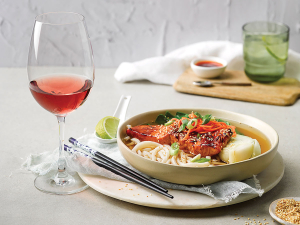A Thousand Gods
I like to think that when Simon Sharpe and Lauren Keenan heard they'd been named The Real Review Rising Star of the Year, they cried out "miladiou!"
 Many international wine brands already using Tetra Pak cartons for different styles of wine, from Cabernet Sauvignon to Riesling and Sauvignon Blanc.
Many international wine brands already using Tetra Pak cartons for different styles of wine, from Cabernet Sauvignon to Riesling and Sauvignon Blanc.
We are all familiar with Tetra Pak cartons for our soy milk and orange juice, but Boris Munster, Managing Director for Tetra Pak Oceania, believes cartons are an environmentally friendly and durable alternative packaging option for the wine industry too.
Many international wine brands already using Tetra Pak cartons for different styles of wine, from "Cabernet Sauvignon to Riesling and Sauvignon Blanc - and everything in between", he says. They recently showcased some of these wines Winetopia and were impressed by the response from consumers. "If the engagement we received during Winetopia is anything to go by, consumers are ready and willing to embrace such a product."
Boris explains Tetra Paks are essentially a carton made from paperboard, with a thin layer of plastic and a layer of aluminium (eight times thinner than a human hair), which is fitted with a screw cap lid. No New Zealand wineries are currently using the format, but Boris says they have had discussions with local wine producers who have shown interest in the carton. "Decisions could be made on a product-by-product basis, and wine in carton can complement traditional wine packaging."
Like many of the alternative packaging formats, environmental impacts are driving interest from the wine industry. Tetra Pak has carried out several life cycle assessment studies and found "a carton has a carbon footprint that is 12 times lowr than a glass bottle". When it comes to transport it is 17 times lighter than a glass bottle, Boris says. "Distributing wine in cartons requires around 50% fewer trucks on the road". Cartons can be recycled in New Zealand by saveBOARD in Hamilton, who produce low carbon building materials from recycled packaging.
Jimmy Stewart is quite literally chipping away at circularity.
A Wine Marlborough Lifetime Achievement Award is “very premature”, say Kevin and Kimberley Judd, nearly 43 years after they came…
Wine tourism has evolved into a sophisticated, diverse and resilient part of the New Zealand wine sector's economy. Emma Jenkins MW talks…